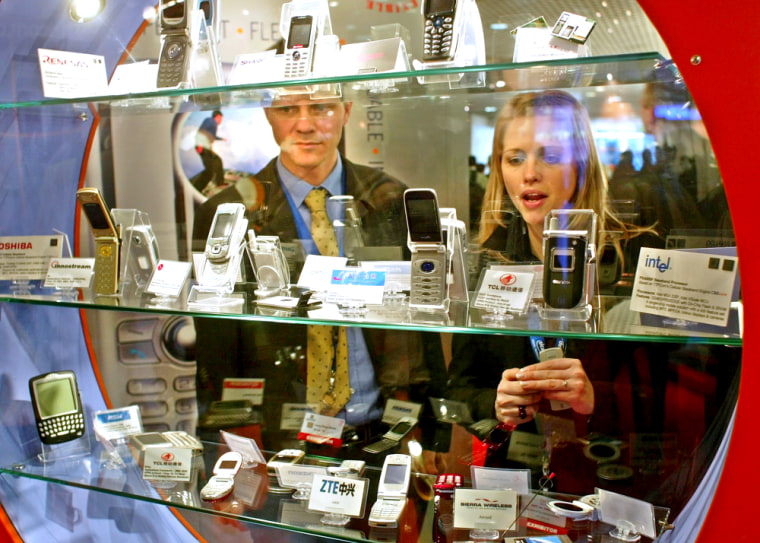With a covetous eye on the success of portable music players, mobile phone makers are going after would-be iPod buyers by building high-quality players into their handsets.
Sony Ericsson announced Monday it would soon market music-player mobiles under its parent’s Walkman brand, drawing on the music catalogue of a sister company, Sony BMG, the world’s No. 2 record company.
And Nokia Corp., the world’s leading phone maker, announced an alliance with Microsoft Corp. to allow mobile subscribers to load music from a PC onto their phones — much the way that a digital music player works.
Unlike owners of dedicated MP3 players, Nokia users will also be able to download tracks directly onto their handsets through the wireless phone network and transfer them to computer for storage or burning onto a CD.
At a news conference on the first day of the 3GSM World Congress, a major mobile industry gathering on the French Riviera, Nokia also unveiled a new “3G” phone with an integrated music player and high-quality stereo output.
“Music is the next big thing in mobile multimedia,” said Anssi Vanjoki, head of Nokia’s multimedia division.
Mobile phone makers and networks are looking for ways to boost their revenue given difficulties finding new customers in saturated industrialized markets and even in some developing countries.
Motorola in deal with Net phone firm
Free voice calls over the Internet pose a further threat to revenues, forcing mobile operators to look to entertainment and data services for their future profitability. Such calls could soon be possible with mobiles: Motorola Inc. and Internet phone company Skype Technologies SA have just teamed up to explore that possibility.
With high-speed 3G networks now widespread, companies like Nokia hope demand for pricier, more sophisticated phones and airtime will be spurred by new features from wireless gaming and instant messaging to pay-TV and remote banking services.
The uptake of 3G phones last year fell short of earlier predictions, but Nokia said Monday it still expects usage to reach 70 million people at year’s end, up from 16 million in December.
The company unveiled three new models Monday: two 3G "smartphones," the 6680 and 6681, and the 6101 folding camera phone that can be heavily customized to suit operators’ needs and branding. Each features two cameras — for video and still images. The 6681 also has a music player delivering high-quality audio through a stereo output as well as a new application that organizes music tracks into iPod-style playlists.
With up to a gigabyte of storage — or a quarter of the capacity of the iPod Mini from Apple Computer Inc. — the 6681 can hold more music than many of the flash-based MP3 players currently on the market.
Nokia has partnered with Seattle-based Loudeye Corp. to provide a download service to make songs available and hinted that deals with recording labels could follow.
Jonas Guest, Nokia’s vice president for entertainment, said the company is already “in talks” with unspecified mobile network operators about implementation.
Meanwhile, Motorola Inc. introduced three new models of its ultra-thin Razr cell phone, hopeful that different designs will keep up the momentum of the hot-selling line. Motorola has marketed the style-conscious Razr heavily since its launch last fall.
Smaller rival Sony Ericsson also announced two new 3G phones: the K600 designed for business applications such as video conferencing and seamless e-mailing; and the Z800i, a clamshell design with an MP3 music player and user-friendly playlists.
But the bigger news was the imminent arrival of the new Walkman phones, which the company said will be unveiled in March.
Sony Ericsson President Miles Flint said the phones will handle open standards including MP3 and AAC, but refused to be drawn on which networks were likely to launch them commercially.
“I think it’s fair to say that we’re talking to many and the reaction’s been positive,” Flint said.
Nokia, Microsoft, Sony Ericsson and others believe a strong musical offering — unlike ringtones and other essentially cosmetic downloads — has the potential to win over new customers for mobile networks and the handset brands they offer.
Their appetites have been whetted by the success of Apple’s iconic music player, analysts say, which sold more than 4.5 million units in the quarter ended Dec. 25.
Now they’re betting they can win a slice of the iPod’s phenomenal business by providing their own selection of high-quality music downloads from a single handheld — with a phone thrown in.
Roger Kay, an analyst at Framingham, Mass.-based IDC, said the mobile industry may be able to pack more features for the same price as an MP3 player because it typically sell handsets below cost and make their money back on subscriptions and airtime.
But he said the slick, user-friendly simplicity offered by many dedicated players including the iPod will be difficult to match.
“If they do,” he said, “then they could give Apple a run for its money.”
